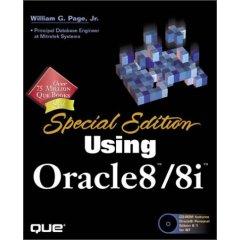| 2020ok Directory of FREE Online Books and FREE eBooks |
Free eBooks > Computers & Internet > Programming > General > Special Edition Using Oracle8
Special Edition Using Oracle8by David Austin, Willard Baird, Mathew Burke, and Nicholas Chase  Download Book If you are the author or the publisher, and would like to link to your site here, please contact us. About Book Amazon.com Special Edition Using Oracle8/8i delivers a well-balanced mix of tutorials, upgrade information, and administration instruction. As such, this book serves well as an overview to Oracle concepts and a daily reference for DBAs in the field. Instead of simply covering the features of Oracle, author William Page--with help from a number of other authors--puts the elements in good general perspective with introductory discussions of key topics. The book opens with a series of excellent chapters on the basics of database management and relational databases, including, of course, Oracle's approach. The book covers the entire spectrum of Oracle subjects (from tablespaces to tuning), and in addition to its coverage of Oracle 8i, there are several chapters dedicated to the architecture of Oracle7 as well as technical comparisons and migration issues. The text is subtly highlighted with blue headings and page labels for a very readable format. The "Contents at a Glance" section is right on the cover page, offering quick lookups to favorite chapters. The CD-ROM includes a copy of Oracle8i Personal Edition 8.1 for Microsoft Windows NT, sample code, and an electronic chapter on using Oracle on Linux. If you're looking for a single book to explain Oracle and serve as a survival guide, this is a fine choice. --Stephen W. Plain Topics covered: Principles of DBMS's; database normalization; Oracle 7.x, 8.x, and 8i architectures; performance optimization; security; recovery; Oracle tools; Oracle Application Server (OAS); parallel and distributed database management.
Related Free eBooks | Related Tags |












SEND A COMMENT
PLEASE READ: All comments must be approved before appearing in the thread; time and space constraints prevent all comments from appearing. We will only approve comments that are directly related to the article, use appropriate language and are not attacking the comments of others.